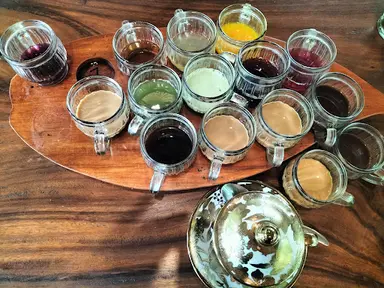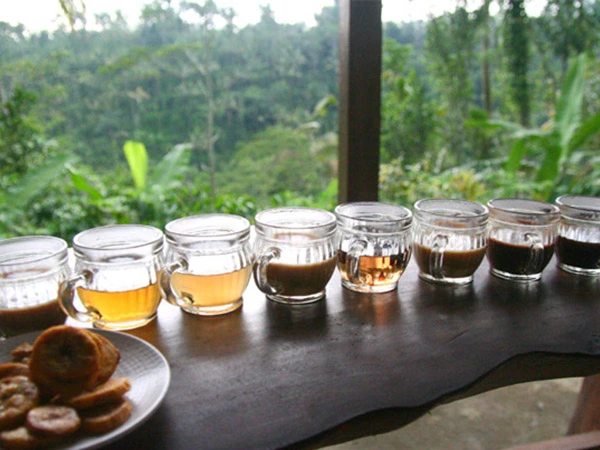Ubud, the cultural gem at the heart of Bali, is not only famous for its verdant rice terraces, traditional arts, and profound spirituality. Beneath its stunning natural beauty lies an intriguing aromatic treasure: coffee plantations. Visiting a coffee plantation in Ubud offers a unique experience that blends natural beauty, education about the coffee process, and, of course, the opportunity to taste some of the world’s most exotic coffees, including the legendary Luwak coffee. This article will take you on a virtual journey to the coffee plantations of Ubud, uncovering their history, the production process, and why this place is a must-visit for every coffee lover.
A Brief History of Coffee in Bali and Ubud

Coffee has been an integral part of Bali’s agricultural culture for centuries. Coffee plants were first introduced to Indonesia by the Dutch in the 17th century. Bali’s climate and fertile volcanic soil proved to be ideal for coffee cultivation, particularly the Robusta and Arabica varieties. In and around Ubud, many small farmers have managed their coffee plantations for generations, often using sustainable, traditional methods.
Coffee plantations in Ubud are more than just places to grow coffee; they are centers where traditional Balinese farming practices meet innovation in coffee processing. Many of these plantations employ integrated farming systems, where coffee is grown alongside other spice plants like vanilla, cocoa, and cloves, creating a rich and diverse ecosystem.
From Bean to Cup: The Coffee Making Process
Visiting a coffee plantation in Ubud is a rare opportunity to witness firsthand the entire life cycle of coffee, from bean to cup.
- Planting and Harvesting: You will see lush coffee trees thriving. Farmers usually hand-pick coffee cherries, selecting only those that are perfectly ripe. This is a crucial step to ensure the best quality.
- Coffee Bean Processing: After harvesting, the coffee cherries are processed to separate the beans from the skin and pulp. There are two main methods:
- Dry Method: Coffee cherries are sun-dried until they are completely dry, then the outer layers are removed. This method often results in coffee with a fuller body and a sweeter flavor.
- Wet Method: Coffee cherries are pulped, fermented in water, washed, and then dried. This method tends to produce coffee with brighter acidity and a cleaner taste.
- Drying and Hulling: The processed coffee beans are then dried to a specific moisture content and hulled to remove the last protective layer (parchment).
- Sorting and Roasting: The coffee beans are sorted by size and quality. Then, these green coffee beans are roasted. The roasting process is an art in itself, where temperature and duration affect the coffee’s final flavor profile. Each plantation often has its unique roasting profile.
- Grinding and Brewing: The roasted coffee beans are ground just before brewing, ensuring maximum freshness and aroma when served.
Kopi Luwak: Bali’s Unique Sensation
One of the main attractions of coffee plantations in Ubud is the opportunity to learn about and taste Kopi Luwak. This coffee is famous worldwide for its unique and controversial production process. Kopi Luwak beans are produced from coffee cherries that have been eaten and digested by the Asian palm civet (luwak), then excreted as droppings.
The civet’s digestive enzymes are believed to ferment the coffee beans, breaking down certain proteins, resulting in a coffee with lower acidity, a smoother body, and a richer, less bitter taste. Although controversial due to animal welfare concerns, many plantations in Ubud now operate with more ethical practices, collecting wild civet droppings or ensuring spacious enclosures and a healthy diet for captive civets. It’s important for visitors to choose plantations committed to ethical practices.
The Coffee Tasting Experience
After witnessing the process, it’s time to taste the fruits of this labor. Most coffee plantations in Ubud offer complimentary coffee tasting sessions, where you can sample various coffee and herbal tea varieties they produce. This can include Balinese Arabica, Robusta, coconut coffee, ginger coffee, and various fruit teas. Of course, Kopi Luwak is usually offered as a premium, paid option. This is a perfect opportunity to compare tastes and aromas and find your favorite.
Read Also: Luwak Coffee: The World’s Most Unique Brew from Indonesia
FAQ (Frequently Asked Questions)
Q: How much does it cost to enter a coffee plantation in Ubud? A: Generally, entrance to the coffee plantation and basic coffee tasting sessions are free. However, tasting Kopi Luwak usually incurs an additional charge.
Q: Are coffee plantations child-friendly? A: Yes, most coffee plantations are child-friendly. Children can enjoy seeing the plants, animals (if civets are present), and the coffee-making process.
Q: Can I buy coffee there? A: Absolutely! Every plantation has a souvenir shop where you can buy fresh coffee beans, ground coffee, teas, spices, and other local products.
Q: Is this tour suitable for vegetarians/vegans? A: Yes, as the focus is on coffee and plants, this tour is suitable for vegetarians and vegans. Be sure to inquire about ingredients in teas or other processed products if you have dietary concerns.
Q: What’s the best way to reach the coffee plantations? A: Most coffee plantations are located on the outskirts of Ubud. You can reach them by taxi, renting a scooter, or by joining an organized tour that often includes a visit to a coffee plantation as part of their itinerary.
Conclusion
A visit to a coffee plantation in Ubud is more than just a tour; it’s a profound multi-sensory experience. From learning about the history and intricate process of coffee making to tasting unique varieties amidst stunning natural landscapes, you will leave with a newfound appreciation for this beloved beverage. It’s a journey that blends culture, nature, and gastronomy, making it one of the highlights of your trip to Bali.

